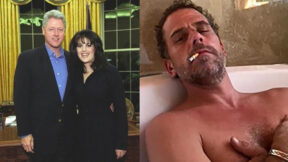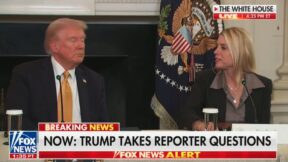Daily Download Editor Blasts White House And MSNBC For Knowing What ‘Off The Record’ Means
 Mainstream and conservative media consternation about President Obama‘s off-the-record meeting with MSNBC hosts (and others, though you wouldn’t know it from the headlines) continued Monday morning with a strongly-worded column from Daily Download Managing Editor Ben Jacobs, who claimed not to object to the meeting itself, but to the fact that the White House, he claims, “refused to let them disclose that the meeting even happened,” which he claims “marks a new low for the Obama administration’s dealings with the press.”
Mainstream and conservative media consternation about President Obama‘s off-the-record meeting with MSNBC hosts (and others, though you wouldn’t know it from the headlines) continued Monday morning with a strongly-worded column from Daily Download Managing Editor Ben Jacobs, who claimed not to object to the meeting itself, but to the fact that the White House, he claims, “refused to let them disclose that the meeting even happened,” which he claims “marks a new low for the Obama administration’s dealings with the press.”
Unfortunately, Jacobs’ accusation is completely unfounded, and likely stems from other sources of frustration.
Last week, President Obama met with a group of left-leaning journalists and pundits, including MSNBC hosts Al Sharpton, Rachel Maddow, Ed Schultz, and Lawrence O’Donnell, a progressive Murderers’ Row whose presence in the White House drove conservative media types up a wall (and into amnesiac outrage), but even mainstream media folks like Howard Kurtz and The Washington Post‘s Erik Wemple have expressed concern about the meeting. While he evinces general distaste for off-the-record meetings, Wemple acknowledges that they’re common, so the main source of his pique seems to be that he’s been left out:
Journalists make a profession of agitating for openness, for the sharing of information, for speaking with public officials and reporting back. In this case, though, attendees aren’t doing a lot of reporting back. Most of MSNBC’s prime time lineup — Al Sharpton, Ed Schultz, Rachel Maddow, Lawrence O’Donnell — attended the Tuesday session, yet MSNBC won’t talk about it. Two individuals from the opinions section of The Washington Post — Jonathan Capehart and Greg Sargent — had seats at the table but won’t tell a dear colleague what went down.
That frustration is completely understandable, and uniquely relevant to media reporters. It’s one thing to be worked, or stonewalled, or evaded, by a source, but when almost all of you sources are also your colleagues, it adds insult to injury, but it’s a part of our everyday lives. When I’m having drinks with a reporter friend, inevitably, an anecdote will be preceded by “This is off the record, of course,” which, to a reporter, is like a waiter telling another waiter, “I don’t have to leave you a tip, right?” and for a media reporter, it’s like a waiter whose only customers are other waiters who don’t like to tip.
If Capehart and Sargent really wouldn’t talk to Wemple off-the-record about the meeting (which Wemple would then be unable to report), well, that’s pretty cold, but it’s also nothing more than an understanding of what “off-the-record” means. As Aldo Leopold said, “Ethical behavior is doing the right thing when no one else is watching- even when doing the wrong thing is legal.”
That’s the nature of the profession, though, and one that we fight through in other ways. Adding to the frustration is that our beat consists of news organizations, particularly TV news, that are more protective of their talent than even your average political press office. That’s why Ben Jacobs’ criticism seems particularly misdirected. Like Wemple, he acknowledges the frequency of off-the-record confabs, but accuses the White House of extracting extraordinary secrecy:
Politicians frequently talk to reporters off the record, but rarely is the existence of those conversations off the record.
Until now. As Erik Wemple reported for the Washington Post, Barack Obama brought a group of liberal or left-leaning journalists for a private meeting at the White House last week and refused to let them disclose that the meeting even happened. In fact, the only evidence that the meeting occurred is a statement from the White House itself reporting that “the president met with influential progressives to talk about the importance of preventing a tax increase on middle class families, strengthening our economy and adopting a balanced approach to deficit reduction.”
That’s self-evidently not true, though, because not only did the White House announce the existence of the meeting, and not only did Wemple report example after example of attendees telling him that “the meeting” (acknowledging its existence) was off the record, but Ed Schultz even tweeted a picture of his view on the way into the meeting. The problem isn’t a failure to acknowledge the meeting’s existence, it’s the fact that the attendees of that meeting are being too ethical, adhering too closely to the unambiguous definition of “off the record.”
Jacobs does identify some valid critiques o this White House, including the tendency to communicate “(e)ven the most banal statements of facts… only on background,” but they can hardly be blamed for MSNBC’s apparently hyper-ethical news culture.
Not to get all pop-psyche about it, but the fainting and fanning from mainstream media types could also be a form of resentment against the suddenly-cool kids jumping the velvet rope ahead of them. White House reporters, for example, have, in the past, had no problem enforcing extraordinary secrecy about far more mundane events:
We reported yesterday that Politico’s Mike Allen was spotted milling about as a guest at the White House’s “backyard bash” by the pool reporter, who was allowed into the event for 40 minutes and kept in a pen before being ushered out. When Allen quoted from the pool report in his Playbook column the next day, he deleted a reference to his own name and didn’t bother to tell his readers that he was actually at the party.
Allen was following the same guidelines, to an even more absurd degree, because in the news business, we’re all supposed to know what off the record means. It’s a paradox that’s baked into our profession: we thrive on other people’s leaks, but die by our own. That makes reporting on reporters extra-annoying, but it’s not a scandal.
Update: Ben Jacobs responds, and at the risk of starting a feud, takes this way too personally. The “cool kids” comment was meant generally, and as a metaphor for mainstream journalists protective of their turf, not anyone’s actual coolness. I have nothing but respect for the grooviness of my colleagues in the White House press corps, for example, but they’re not above bristling when an outsider horns in. I’m also well aware that Ben Jacobs is so cool, his friends call him Bentyne.
But he also claims I “miss the point” by “conflating two very different issues,” and that “Off the record doesn’t mean denying that the conversation took place, as Markos Moulitsas did. Nor does it mean totally stonewalling, as the MSNBC and Washington Post folks did.”
Because my original commentary was so lengthy, I didn’t include all of the quotes from Wemple’s article, but here they are:
“Since it was off the record, she’s unable to discuss,” responded Huffington Post spokesman Rhoades Alderson when asked whether his boss could pick up the phone. – The “it” in question is the meeting. “It was…” means “The meeting was…,” which is an acknowledgement that it occurred.
That’s almost exactly the same as the statement Jacobs approves of, from Josh Marshall’s spokesman: “Since the meeting was off the record, Josh is not available to speak about it.”
Then, there’s Markos Moulitsas’ evasion, which Jacobs stretches into a “denial,” which it is not:
Markos Moulitsas of Daily Kos fame also allegedly took part and also won’t talk: “Sorry, but I don’t discuss who I do and don’t meet with. Thanks, markos,” he e-mailed to the Erik Wemple Blog.
So, of the three people Wemple asked, two of them acknowledged the meeting, and one gave a snotty kiss-off. Plus, the White House put out an official statement acknowledging the meeting. These are not points that I missed; they’re all addressed in the body of this post.
As for whether journalists should agitate for more openness and transparency, the answer to that is “yes,” and the best way to achieve that is for journalists to refuse off-the-record meetings like this, which Jacobs would surely do were he offered one, not to violate journalistic ethics by discussing off-the-record meetings with reporters who weren’t there.
To clarify, the point is that Jacobs’ complaint that the meeting’s existence isn’t being acknowledged by the participants is false, which suggests that complaint is a proxy for something else. which could include the legitimate frustrations I outlined above, or some territorial resentment, or a combination thereof.
Please read Jacobs’ full rebuttal at The Daily Download.
This is an opinion piece. The views expressed in this article are those of just the author.




